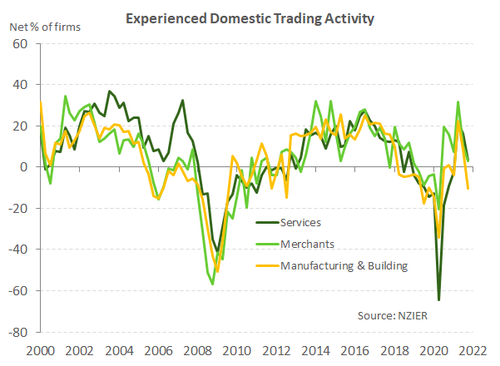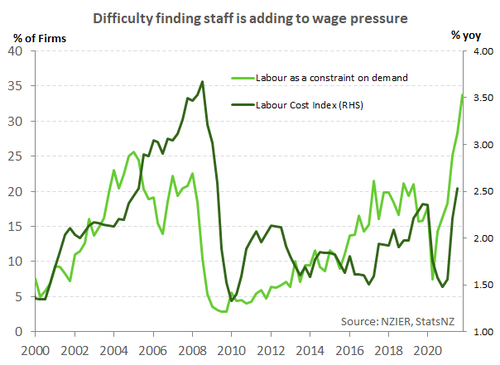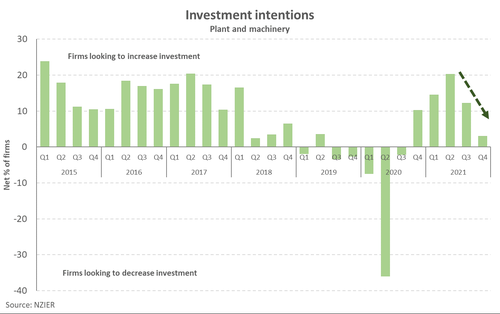
- Business confidence flopped at the end of last year. A net 34% of firms see a deterioration in business conditions this year.
- Ongoing disruptions from covid look to have worn down some of the business communities’ resolve, adding a cautious tone to investment and hiring decisions.
- Rising cost pressures are also likely to be wearing down confidence. Labour is difficult to find and will lead to rising wage growth ahead.
- Firms are hiking prices as a result. A net 52% of businesses increased prices in the fourth quarter, the highest share since 1987.
Business confidence generally deteriorated in the final quarter of 2021, according to NZIER’s latest Business Opinion Survey (QSBO). A net 34% of firms see a deterioration in general business conditions - the lowest reading since Q3 2020. Moreover, firms experienced a fall in own activity with softening demand. Manufacturing led the fall in domestic trading activity.
Ongoing disruptions from covid look to have worn down some of the business communities’ resolve and added a cautious tone to investment and hiring decisions. December’s survey is concerning given an Omicron outbreak is presumably just around the corner. Fortunately, firms expected activity and profitability held up, but remain below survey average readings.
Inflationary pressures were evident and appear to be accelerating, with inflation indicators flashing red. Readings of firms’ costs lifted further from already elevated levels and likely added to pessimism. And costs are being passed on, with firms’ pricing intentions following suite. Scratching the surface and it’s easy to see why inflation pressure is building. A closed border means it’s becoming increasingly difficult to find skilled staff. A net 73% of firms struggled to find skilled staff, which was a third consecutive survey record. And an exceptionally tight labour market is driving up wages. Capacity and access to supplies are also major constraints.
Today’s survey reinforces the RBNZ’s need to continue to tighten monetary policy. The RBNZ will want to ensure that bubbling price pressures do not become entrenched in firms’ pricing decisions. We expect the RBNZ to steadily lift the cash rate this year and into next, with the next 25bp hike coming in February.
Pricing pressure accelerated last year.
NZIER noted today that there were some errors in the previous QSBO. These errors had led to a fall in readings of costs and pricing intentions over the September quarter. We had noted at the time that falling inflation indicators seemed at odds with ongoing and well documented supply-chain bottlenecks. NZIER today revised the survey data and revealed that firms costs, and pricing intentions rose consistently over 2021. From a net 8% of firms increasing prices at the start of 2021, a net 52% hiked prices in December – the highest share since 1987! And a net 63% intent to hike their prices at the start of 2022.
Sources of rising costs are easy to see in the QSBO. Labour, both skilled and unskilled is extremely hard to source at present. A development brought on by covid and a closed border that has drastically limited access to foreign workers. A net 73% of firms noted difficulty in finding skilled staff, which was a third consecutive survey record. And as a constraint on business turnover, labour remains at the top of the list. A net 34% of respondents pointing to labour availability as their biggest challenge. The extreme tightness in the labour market will lead to further wage increases, which adds to underlying cost pressure.
Plans on hold
Last year’s Delta lockdown sapped business confidence and many were expecting a deterioration in economic conditions over the year ahead. With the looming threat of community transmission of Omicron, now an even greater share of firms share the same view – a net 34%, up from net 11% (seasonally adjusted). Naturally, such expectations stall any plans to expand business. Now only a net 3% of firms surveyed intend to increase investment in plant and machinery in the coming months, down from 13%. 
Hiring intentions remain elevated. However, a shrinking pool of available workers due to the closed border questions whether such demand can be met, The QSBO report again underscored the labour shortage firms continue to face.

